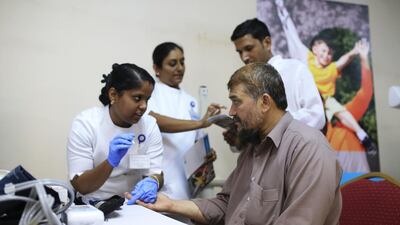DUBAI // Low salaries and a lack of awareness are the major reasons why about 15 per cent of blue-collar workers suffer from diseases of the eye but ignore them until the symptoms become severe.
A healthcare provider that offers free eye tests and glasses to low-paid workers said more needed to be done to improve eye care.
Construction workers are constantly exposed to bright sunlight, construction materials, chemicals, dust and sand, said Alisha Moopen, executive director and chief executive of Aster Hospitals and Clinics, who believes that there is an urgent need for regular eye check-ups among workers, in addition to broader health screening.
Proving her point, bricklayer Ahmed Khan said he ignored itching in his right eye for a week, until the swelling and pain became unbearable.
“About a week ago, while working on a site, something got into my eye. Since then it has been reddish and is itching but I continued to work,” said the 25-year-old Pakistani.
“I didn’t go to the doctor because my medical card had expired and processing of the new card was taking time. I also could not afford to pay the doctor’s fee from my pocket. I took Panadol for my pain but it never helped.”
Mr Khan eventually found someone who offered to pay the doctor’s fee and the cost of medicine. “I am thankful to this lady who helped me,” he said. “I was so scared that I would become blind just because I don’t have money. How would I work and earn? I am the only breadwinner for my family back home.”
To help workers such as Mr Khan, Ms Moopen began a campaign – Nazar [eyesight in Hindi and Urdu] – in Dubai in September last year that provides medical assistance to workers unable to afford specialist care.
The campaign also provides glasses and other medical support to the men, free of charge. So far it has reached between 2,500 and 3,000 workers, with the goal for this year of offering check-ups to 7,000 men.
Tariq Javed, who has worked as a driver for a construction firm in Dubai for more than 17 years, said he knew his eyesight was getting worse by the day, affecting his driving. But he could not afford to buy glasses and his medical insurance did not cover the cost.
“For the last year, I’ve faced problems with my eyesight. I cannot see properly on roads, especially signboards,” the 45-year-old Pakistani said.
“I knew I needed glasses but I can’t afford to spend hundreds of dirhams on doctor’s fees and glasses. I was waiting for my annual leave so that I could get [glasses] from my home country, where it would be cheaper for me.”
Thankfully he found out about the Nazar campaign and Mr Javed now has the glasses he needs to do his job safely.
Ms Moopen said that the campaign had identified that about 15 per cent of workers have eye problems. She said that the workers’ need to send money home was to blame for many of them ignoring their ailments until it hindered their work.
Normal reading glasses cost about Dh200, a figure that Aster covers for workers in the continuing campaign.
“We were able to reach out to several companies in the past seven to eight months. The ultimate goal is to screen 7,000 workers. At the pace we have been going, I think by the end of the year we should be able to reach that,” Ms Moopen said.
Aster Hospitals and Clinics is offering the free services at Aster Jubilee Medical Complex, Bur Dubai, while the free glasses are provided by Aster Opticals, also in Bur Dubai.
akhaishgi@thenational.ae

